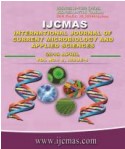


 National Academy of Agricultural Sciences (NAAS)
National Academy of Agricultural Sciences (NAAS)

|
PRINT ISSN : 2319-7692
Online ISSN : 2319-7706 Issues : 12 per year Publisher : Excellent Publishers Email : editorijcmas@gmail.com / submit@ijcmas.com Editor-in-chief: Dr.M.Prakash Index Copernicus ICV 2018: 95.39 NAAS RATING 2020: 5.38 |
A field experiment was conducted during 2005-06 to 2006-07 at Varanasi to find out the effect of three residue management practices viz. R1 (Residue Removal), R2 (Residue Retention alone), R3 (Residue Retention with Trichoderma) and four weed management treatments viz. W1 (Control), W2 (Hand weeding at 30 & 45 DAS), W3 (Isoproturon +2,4-D (1.0+0.5 ha-1 at 30 DAS), W4 (Fenoxaprop 120 g a.i. ha-1 fb Metsulfuron 4g a.i. ha-1 ) on weeds and productivity of zero-till wheat (Triticum aestivum L. emend Fiori & Poal) in rice-wheat cropping system during the winter (rabi) season. Wheat grown under rice wheat cropping system with residue retention with Trichoderma application produced 8.2 and 6.8 % higher grain and 7.3 and 6.2 % straw yield over residue removal treatment during both the year of experimentations. Out of all residue management approaches under test, residue management alone along with isoproturon + 2, 4-D application for weed control gave higher net returns during the course of above study.
 |
 |
 |
 |
 |